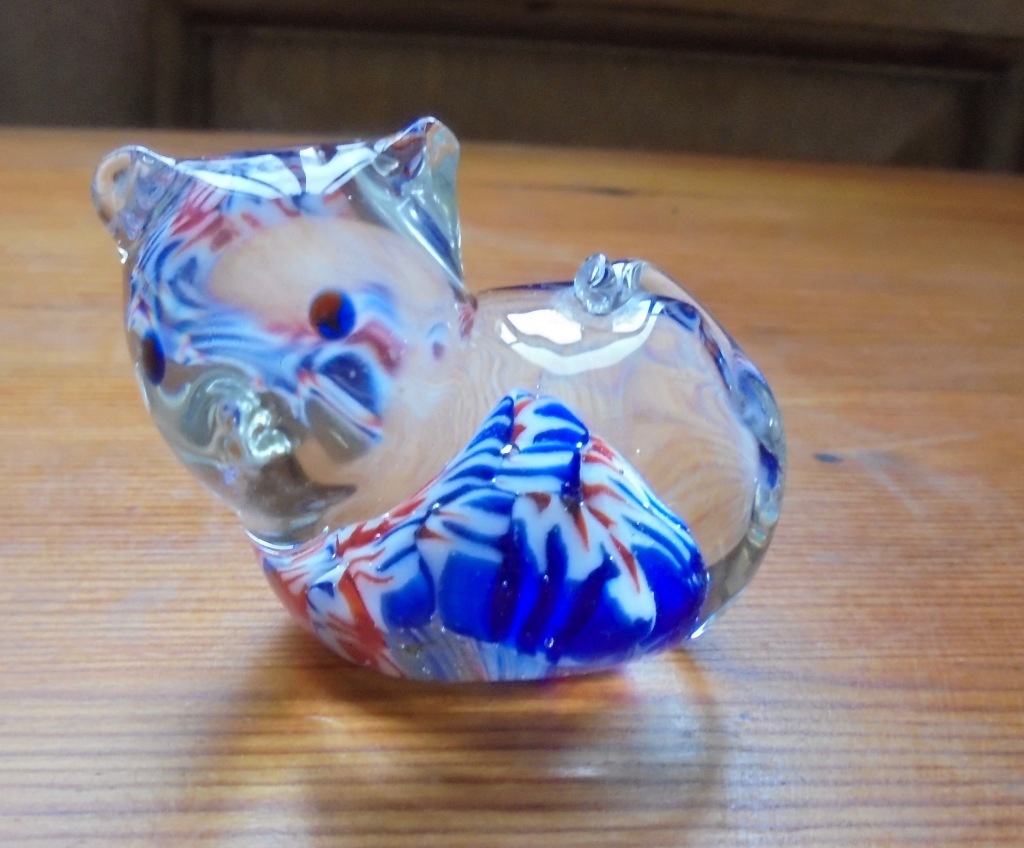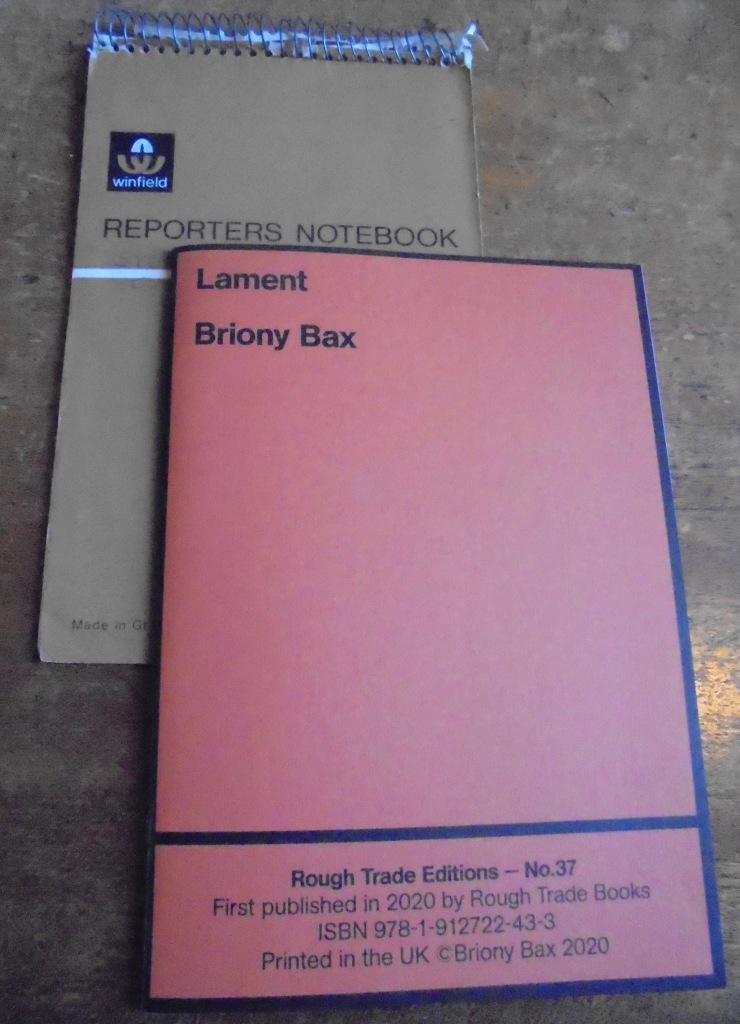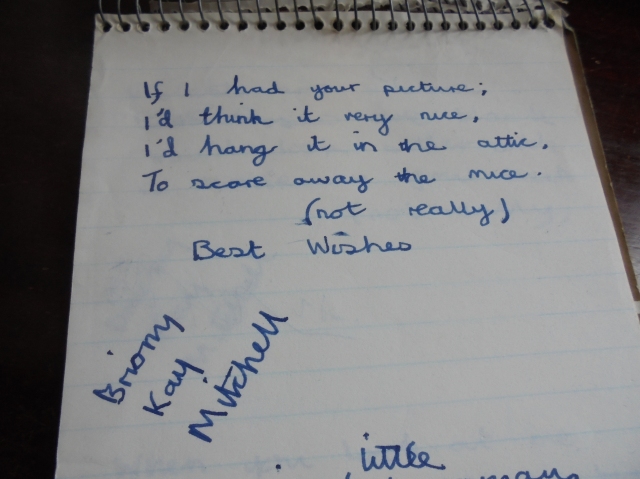
This sweet little Millefiori glass cat figurine is one of the treasured “ordiments” in the Usmeum to have survived from my childhood, a gift from my lifelong friend Briony, to whom this post (linked to my previous post about Norfolk), is dedicated.
I have known Briony since I was 6 days old (you can read an account of our first meeting here). Born next door to each other, we were inseparable for the first 12 years of our lives; our two homes were interchangeable, more like two halves of the same house. Seven months my senior, Briony was in the year above me at Westfields Primary, but outside of school we played together constantly – street games, board games, adventure games, games inspired by film or TV – I remember her frustration with me always wanting to be an animal, regardless of the game (“But James Bond doesn’t have a cat!”). Riding our bikes and walking her dogs Tessa and Mr Tumnus on Barnes Common or along the river towpath; playing Three Billy Goats Gruff under the bridge over Beverley Brook at the end of our road, fishing for tadpoles and sticklebacks and trying to avoid the leeches. Picnics in Richmond Park or by the river at Dukes Meadows.
Briony had two older brothers the same ages as mine, so our families were very close. (I have written previously about her brother Alistair, who sadly died of myeloma in 2019). However, our childhoods differed in fundamental ways that I did not appreciate at the time. Briony’s father, a famous poet and playwright, had abandoned the family when she was a baby, and they hardly saw him. The absence of a father next door never struck me as unusual, I suspect because no-one at home made a fuss about it: as my Mum’s father had similarly abandoned her family, she knew the stigma at first hand and would have made sure nothing negative or judgemental was said. So, unusually for the time, we did not learn to be prejudiced towards one-parent families; on the contrary, our Mum seemed to seek out women who had been abandoned in this way, and go out of her way to help. We often had random neighbour’s children in our home after school, waiting for their single parent to get home from work, mothers would stay friends with my Mum for the rest of her life. So to us kids, the situation next door wasn’t anything unusual, because we hadn’t been taught to think that it was.
When we were about twelve our lives diverged as Briony’s family moved a few streets away, and we all attended different secondary schools. We stayed in touch but contact gradually dwindled as our adult lives grew further apart. She met her husband and they moved to America for an exciting life in New York and later Los Angeles, raising two daughters in Santa Monica where her husband worked in the movie industry. I went to university in Scotland and stayed there a few years, living in a Clackmannanshire village and later working in an Edinburgh bookshop. So we lost touch in the 1980s but, thanks to Alistair, were reunited in the 1990s, and the years fell away when we met up on one of her trips home. Briony’s achievements were astonishing: nothing about her difficult early years had held her back. She was a wonderful mother and tireless campaigner for social justice, especially reproductive rights and family planning. My own life, with my secure, nuclear family background, was a poor show by comparison: a lowly library assistant enmeshed (albeit quite happily) in the rock’n’roll lowlife of Brixton. I remember when I told a friend about Briony he said “It’s like one of those TV documentaries, like Seven Up or something – Child A has turned out like this, whereas Child B…!” I did sort out my life eventually, though. I enjoyed an unforgettable holiday visiting them in their California home in 2005 (by now based in Oakland), where, amongst other things, I got to fulfil a lifelong dream of visiting San Francisco. It was wonderful to have Briony back in my life and we have stayed in touch ever since.
Briony and her family have moved back to the UK now and settled in Norfolk, where she continues to achieve an astonishing amount whilst also being the world’s proudest grandmother. As well as being a Trustee of the Sadia children’s charity that supports an orphanage in Kenya, she is editor of literary magazine Ambit and poetry editor of the New European. And now, she is herself a published poet.

One of Briony’s most impressive achievements is the way in which she became reconciled with her absent father. In later life she reached out to him, offering a bridge of forgiveness and friendship, which endured for the last fifteen years of his life. The bond of poetry formed a strong foundation for that bridge; he even gave her advice to help shape her work, whilst also, inevitably, being the subject of some of it.
This year, Rough Trade Books published a pamphlet of Briony’s work: Lament, a deeply moving, brutally honest account of her experience of caring for someone with mental illness. It is a searing indictment of the UK government’s treatment of people who suffer this way, and those who try to care for them. All proceeds from sale of the pamphlet are being donated to the mental health charity MIND. Sadly the planned launch at the British Library could not take place (cancelled due to COVID like everything this year), but recently I watched Briony give an online reading and Q & A, which revealed much about her childhood that had passed me by back then, as we played princesses and ponies in happy oblivion. I admire her so, so much for what she has achieved with such grace and fearlessness, despite the odds stacked high against her from the start. You can watch her performance, with Q & A session, on YouTube.
This being my family history blog, I can’t resist sharing something from our childhood, if only to show how far Briony’s poetry has come since these early works I found in a reporter’s notebook in the archives – although even then it was far superior to my own efforts!



Briony also came away with us on some of our trips to visit Auntie in Churt, which provides a neat link with my previous post about Auntie’s travels in Norfolk. Four generations of Briony’s family (including her mother Maureen, her brother, daughter, son-in-law and grandson) are now settled in the wilds of Norfolk, living through the COVID lockdown together. I look forward to visiting them when all this is over.

